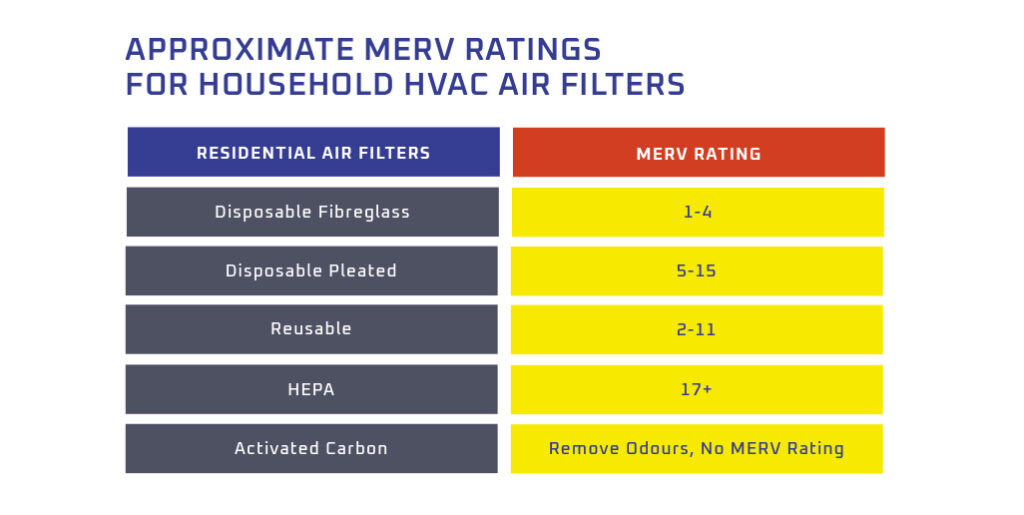What Is A Good Merv Rating For Air Filters
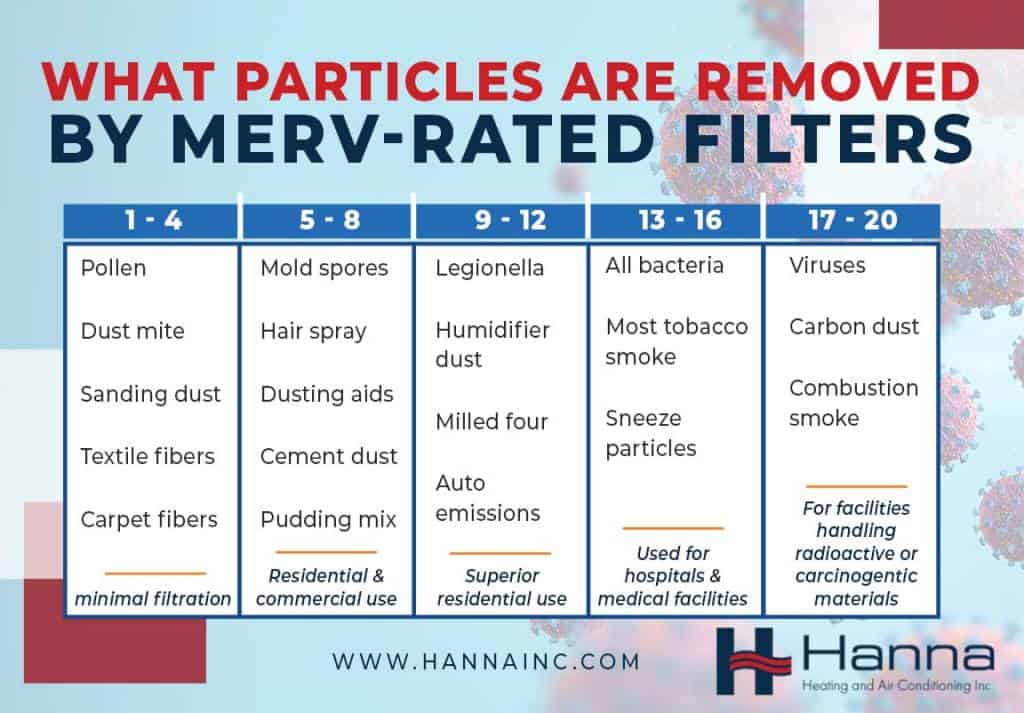
Choosing the right air filter for your HVAC system can feel overwhelming. With a sea of numbers and marketing jargon, understanding what those numbers mean for your indoor air quality and system efficiency is crucial. One of the most important numbers to consider is the MERV rating. But what is a good MERV rating, and how do you determine the best one for your home?
Understanding MERV Ratings
MERV stands for Minimum Efficiency Reporting Value. This rating system, developed by the American Society of Heating, Refrigerating, and Air-Conditioning Engineers (ASHRAE), measures how effectively an air filter captures particles of different sizes. The higher the MERV rating, the more particles the filter can trap.
MERV ratings range from 1 to 20. Lower-rated filters (MERV 1-4) primarily capture larger particles like dust, pollen, and carpet fibers. Higher-rated filters (MERV 13-16) can trap much smaller particles, including bacteria, viruses, and smoke. Filters with MERV ratings of 17-20 are typically used in hospitals and cleanrooms, requiring specialized HVAC systems.
MERV Rating Breakdown:
- MERV 1-4: Basic filtration. Captures large particles like dust, pollen, and carpet fibers. Suitable for window AC units or very basic systems.
- MERV 5-8: Improved filtration. Captures pet dander, mold spores, and some dust mites. A good starting point for many homes.
- MERV 9-12: Superior filtration. Captures smaller particles like fine dust, smog, and some bacteria. Ideal for homes with allergy sufferers or pets.
- MERV 13-16: Excellent filtration. Captures smoke, viruses, and even smaller bacteria. Recommended for individuals with asthma or severe allergies, or for homes in areas with high levels of air pollution.
- MERV 17-20: Hospital-grade filtration. Removes the smallest particles. Typically used in specialized environments.
Choosing the Right MERV Rating for Your Home
Selecting the optimal MERV rating involves balancing air filtration effectiveness with airflow. Higher MERV ratings offer better filtration but can also restrict airflow, potentially causing your HVAC system to work harder and less efficiently. This can lead to increased energy bills and even premature system failure.
Factors to Consider:
- Allergies and Respiratory Issues: If you or someone in your household suffers from allergies or asthma, a higher MERV rating (11-13) is generally recommended.
- Pets: Homes with pets benefit from filters with MERV ratings of 8-11 to capture pet dander and hair.
- Air Quality: If you live in an area with high levels of air pollution, a higher MERV rating (11-13) can help improve indoor air quality.
- HVAC System Compatibility: Consult your HVAC system's manual or a qualified technician to determine the maximum MERV rating your system can handle without compromising airflow.
Important Note: Always prioritize proper airflow. A filter with a very high MERV rating that significantly restricts airflow is worse than a filter with a slightly lower rating that allows for optimal system performance.
The Goldilocks Zone: MERV 8-11
For most residential applications, a MERV rating of 8-11 strikes a good balance between filtration and airflow. These filters effectively capture common household allergens and pollutants without putting undue strain on your HVAC system. Consider upgrading to a MERV 13 filter if you have specific health concerns or live in an area with poor air quality, but be sure to consult with an HVAC professional first.
Popular HVAC Brands and Their Filtration Capabilities
Many leading HVAC manufacturers offer systems designed to accommodate higher MERV-rated filters. Here’s a look at some popular brands and their filtration capabilities:
- Carrier: Carrier offers a range of air purifiers and filters, including those with high MERV ratings. Their Infinity air purifier, when paired with compatible systems, can achieve filtration equivalent to a MERV 15 rating. Carrier's systems often boast high AFUE (Annual Fuel Utilization Efficiency) ratings for heating and SEER (Seasonal Energy Efficiency Ratio) ratings for cooling, indicating energy efficiency.
- Trane: Trane's CleanEffects air filtration system is another option that can capture a high percentage of airborne particles. Trane systems are known for their durability and often come with robust warranties. Look for Trane models with high SEER ratings for energy savings.
- Lennox: Lennox offers a variety of air filtration solutions, including filters with MERV 16 ratings. Their systems are often praised for their quiet operation. Lennox products provide high AFUE and SEER rating options.
- Goodman: Goodman offers more affordable HVAC solutions that still provide adequate filtration. While their filters may not reach the highest MERV ratings, they provide a cost-effective option for improving indoor air quality. Goodman provides solid value and are a popular choice for budget-conscious homeowners.
Beyond MERV: Other Factors to Consider
While the MERV rating is important, other factors can affect your indoor air quality and HVAC system performance:
- Filter Material: Filters are typically made from fiberglass, pleated paper, or electrostatic materials. Pleated filters generally offer better filtration and last longer than fiberglass filters.
- Filter Size: Ensure you purchase the correct filter size for your HVAC system. Consult your system's manual or measure the existing filter to determine the appropriate dimensions.
- Filter Replacement Frequency: Regularly replace your air filters according to the manufacturer's recommendations. A dirty filter can significantly reduce airflow and compromise indoor air quality. Generally, replacing your filter every 1-3 months is advisable.
- Professional Maintenance: Schedule regular maintenance for your HVAC system with a qualified technician. This includes cleaning coils, checking airflow, and ensuring all components are functioning properly.
Warranties and Maintenance
HVAC system warranties vary by manufacturer and model. Typically, warranties cover parts for a specific period, often ranging from 5 to 10 years. Some manufacturers also offer labor warranties. Be sure to carefully review the warranty terms and conditions before making a purchase.
Regular maintenance is crucial for maintaining your warranty and ensuring the longevity of your HVAC system. Most manufacturers recommend annual maintenance by a qualified technician. This typically includes:
- Cleaning the coils
- Checking refrigerant levels
- Inspecting electrical connections
- Lubricating moving parts
- Testing the system's performance
Cost Considerations
The cost of air filters varies depending on the MERV rating, material, and brand. Lower-rated filters are generally less expensive than higher-rated filters. However, the long-term cost of using a lower-rated filter may be higher due to increased energy consumption and potential damage to your HVAC system.
When comparing HVAC systems, consider the upfront cost as well as the long-term operating costs. Systems with higher AFUE and SEER ratings are more energy-efficient and can save you money on your utility bills over time. HSPF (Heating Seasonal Performance Factor) is another rating to consider for heat pumps, indicating heating efficiency.
Conclusion
Choosing the right MERV rating for your air filter is a crucial step in maintaining good indoor air quality and ensuring the efficient operation of your HVAC system. For most homes, a MERV rating of 8-11 provides a good balance between filtration and airflow. However, consider your specific needs and consult with an HVAC professional to determine the best option for your home.
By understanding MERV ratings and other factors affecting air quality and HVAC performance, you can make informed decisions that will improve your comfort, protect your health, and save you money in the long run.

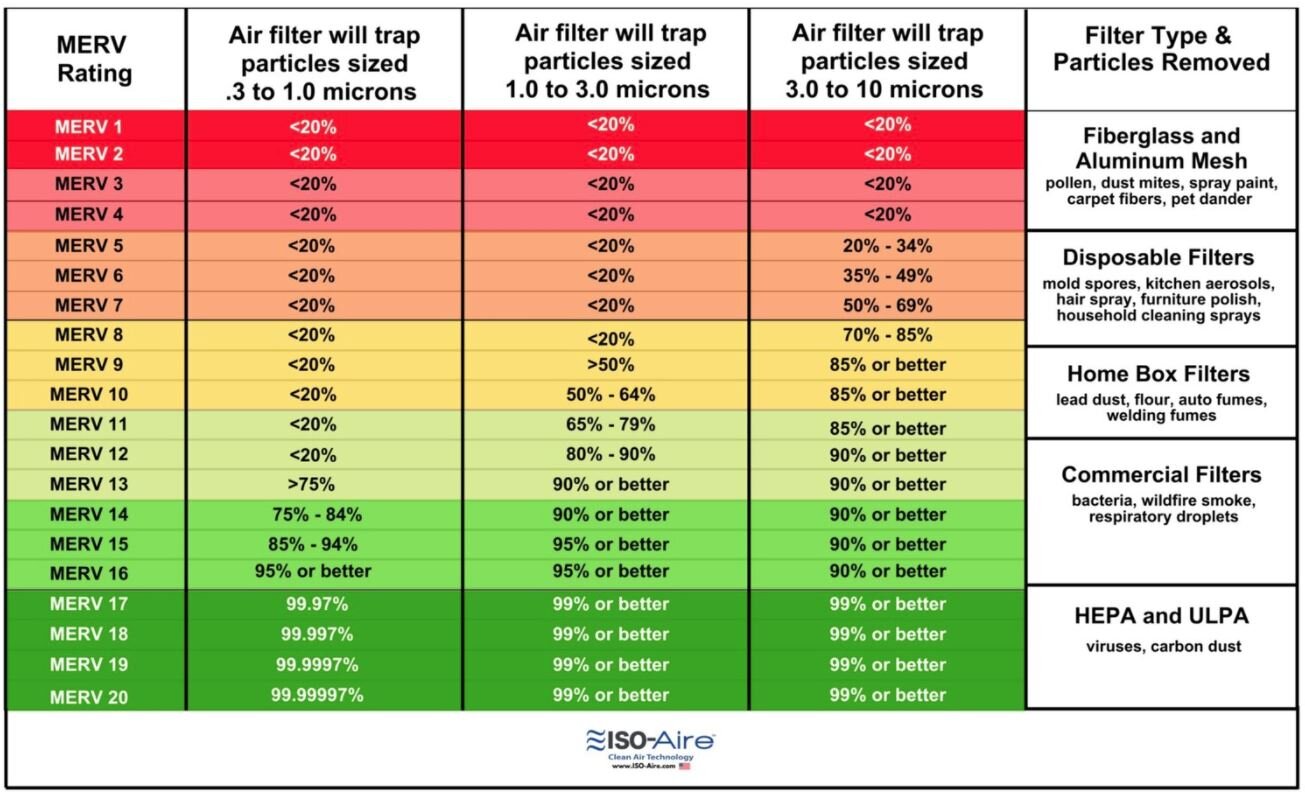
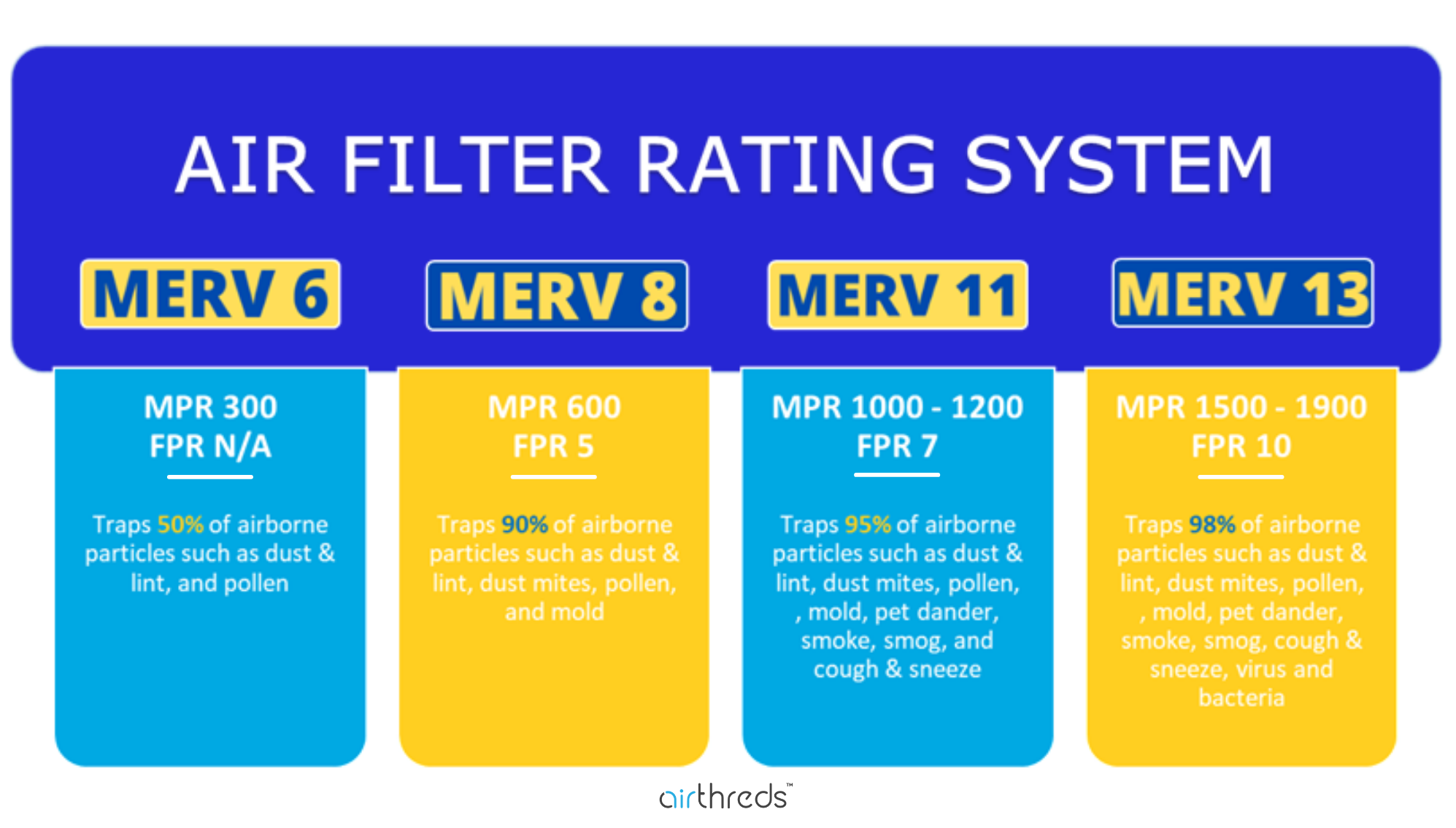

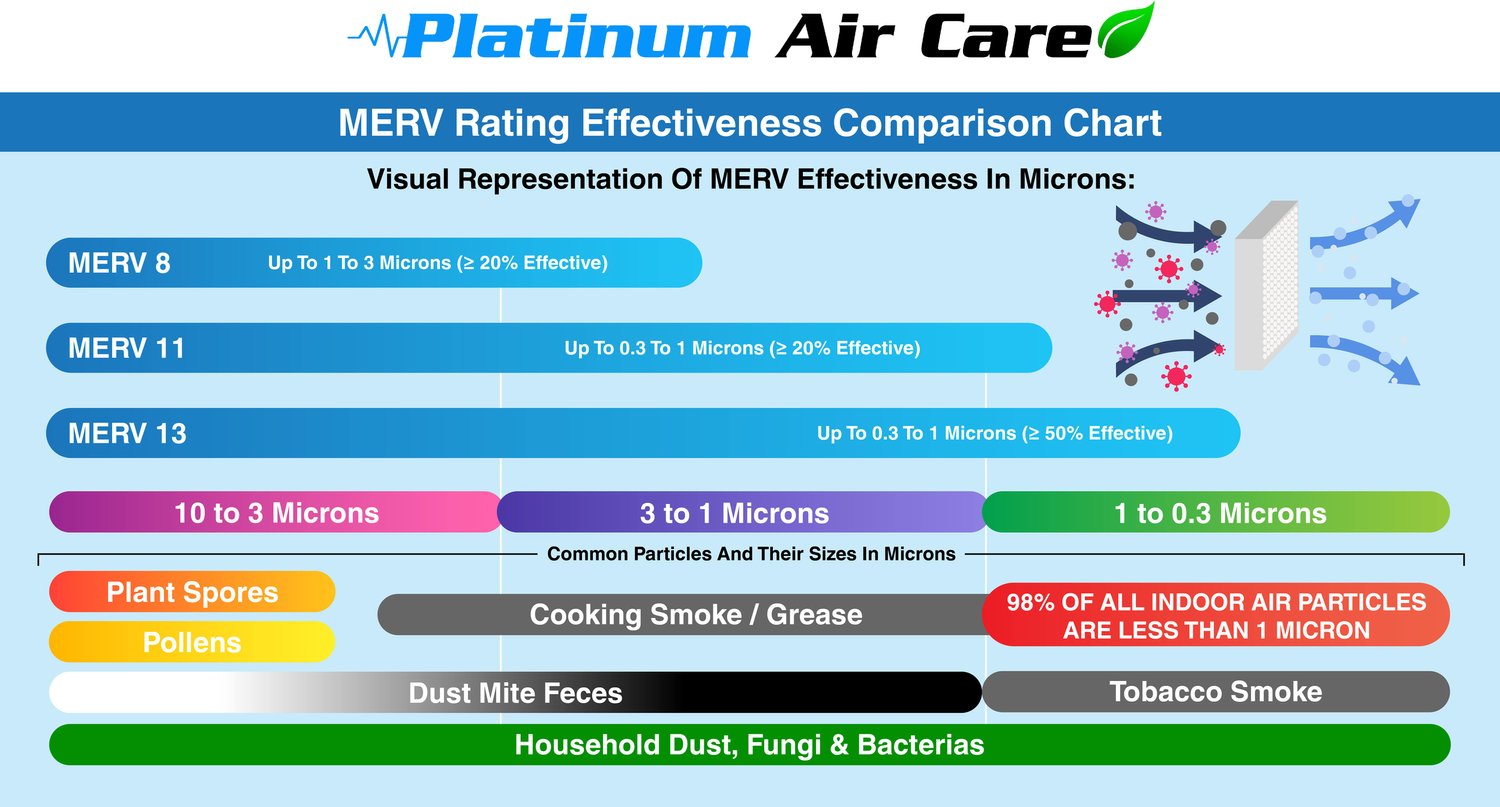
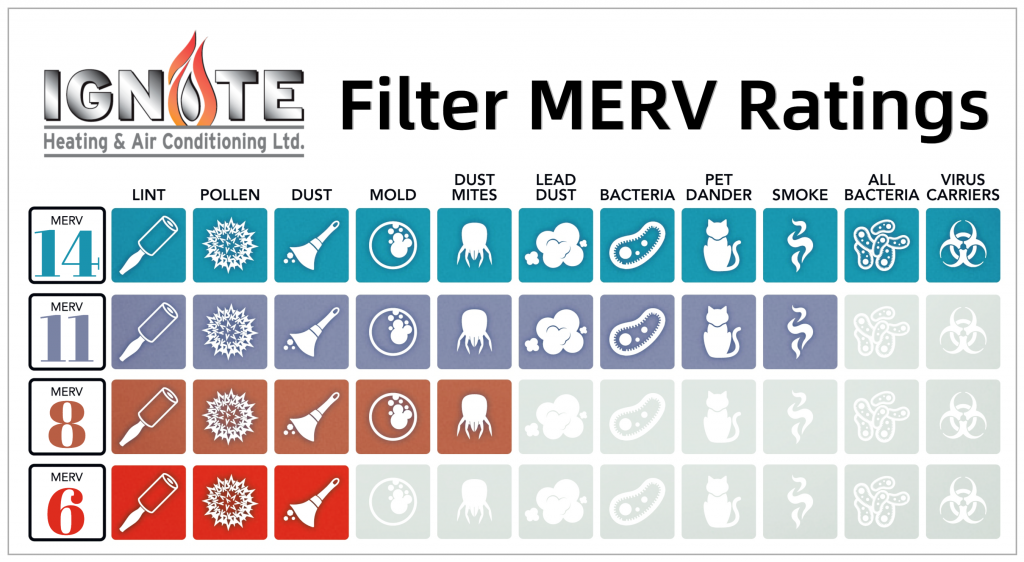
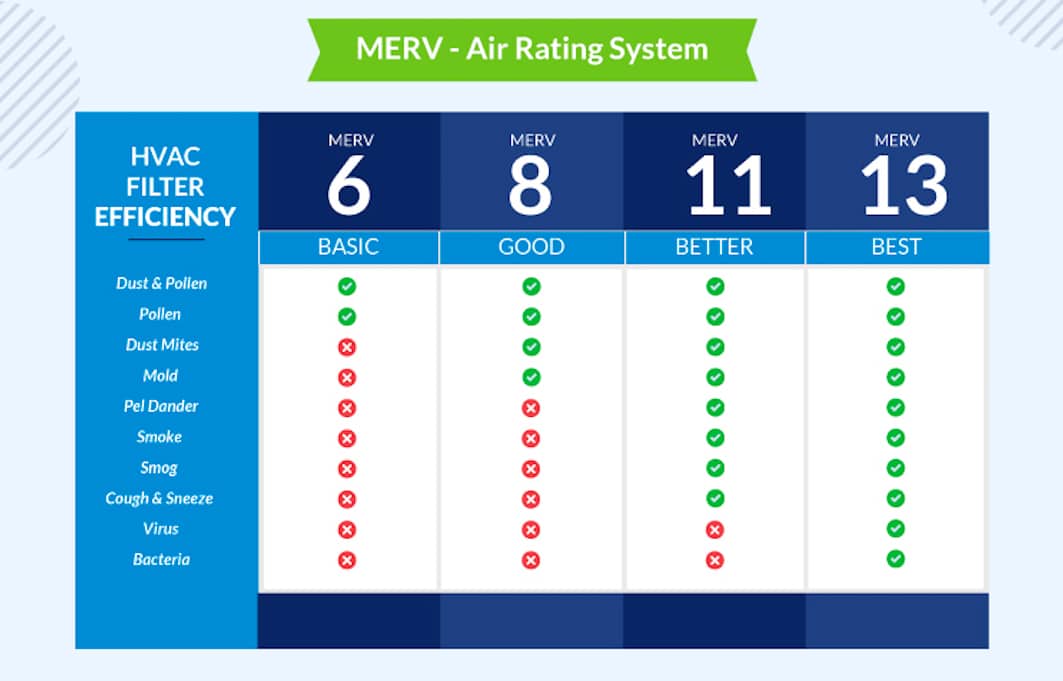
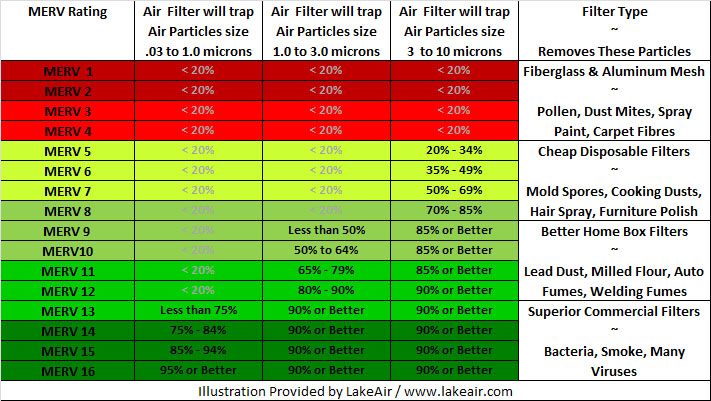
.png?width=820&height=462&name=MERV RATINGS (1).png)
